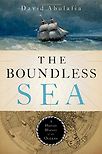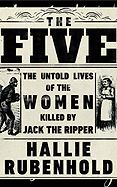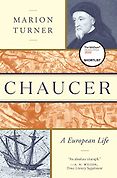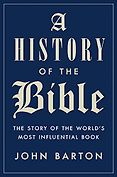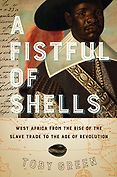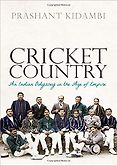We’re talking about the history books that made the shortlist of the 2020 Wolfson History Prize and it’s a fantastic list. I’ve been following the prize a number of years now, and this one seems particularly strong on world history. Is that your impression as well?
Yes, it is. It’s a terrific shortlist and it reflects the extraordinarily high quality of historical research and writing in the UK—because the prize is for the best book written by an historian and author living in Britain. It says, I think, two things about the historical profession. First of all, in Britain, we’re very, very strong indeed, probably the best in the world, on writing serious history that is readable and accessible and not just written by academics for other academics. Secondly, we write and research on an amazing range of topics, not just on British history but on European history, on American history, on global history. The range is quite astonishing.
I ask a version of this question every year, but I’ll ask it again for the 2020 shortlist: with so many good history books to choose from, how did you narrow it down to these six?
First of all, as I said, it’s for a book that is a serious historical work, based on serious research, but also readable and accessible to the wider public. With that criterion you can narrow it down a lot. There are a lot of academic books which are very good indeed but are not aimed at the general public. If you’re reading one of the books submitted and you find three quotations of ancient Greek on page two, then you know it’s not for the general reader. If, on the other hand, you’re reading a very racily told, well-written book and you go to the bibliography and the notes and find that it’s based on a handful of secondary, printed works, and not seriously researched, you can narrow it down from that end as well. There are some journalistic works like that—though some journalists also write really superb, well-researched history.
And you end up with probably a couple of dozen books that you have to consider really carefully—maybe 30, perhaps more, it depends. There are four judges. We’re appointed and reappointed year by year; we’re all professional historians. Each of the judges has to draw up a personal shortlist of ten. Then we meet. This year of course it’s been a virtual meeting, by Zoom. For two to three hours, we discuss the various books each of us has shortlisted and narrow it down to six. It’s a long process, but we manage it fairly successfully.
Let’s talk about the history books that made the 2020 shortlist individually. Why don’t we start with The Five by social historian Hallie Rubenhold, which is about the five known victims of Jack the Ripper. This is a book that’s verging on the true crime genre, so I think will also appeal to people who don’t read history books that much. Can you tell me a bit about it and why you chose it for the 2020 Wolfson History Prize shortlist?
Jack the Ripper was a notorious late Victorian murderer who killed a number of women in the East End of London and has somehow inspired a very large literature, known colloquially as ‘Ripperology.’ The identity of the murderer was never discovered. He—and we assume it’s a he—partially dissected and eviscerated the women he murdered.
Get the weekly Five Books newsletter
This literature has assumed that the women he killed were prostitutes. Hallie Rubenhold, the author of The Five, has researched the lives of these five women absolutely brilliantly. It’s a great piece of detective work into some very obscure sources. She comes up with the absolutely convincing conclusion that only one of the women was a prostitute. The others were just rough sleepers, down on their luck; they were alcoholics or ill.
She really disproves what the ‘Ripperologist’ literature says about the victims and recovers these women’s lives with a good deal of sympathy. It’s a moving book. It’s humane, it’s scholarly, and it challenges, from a feminist position, a whole library of books on Jack the Ripper.
In the book, you’re pulled along by the narrative of their lives, but it also gives a very good sense of the desperate conditions of the poor in Victorian London, doesn’t it?
Yes, it lifts the lid on the underbelly of Victorian London and shows you these poor, downtrodden women really suffering—and then ending in this squalid way.
And after their death, they were dismissed as prostitutes, when they weren’t.
Hallie Rubenhold has rescued them, to use Edward Thompson’s famous phrase, from “the enormous condescension of posterity.” It’s a very moving book.
Let’s talk about The Boundless Sea by David Abulafia next. If you’re interested in global history, this is probably the best book to pick up and read during lockdown. Can you tell me a bit about why you chose it for the 2020 shortlist and why it’s so good?
If Hallie Rubenhold’s The Five is a book that concentrates on the minutiae of a small number of people in the East End of London in a specific period of time, David Abulafia’s The Boundless Sea goes to the opposite extreme: it’s a historical study of the human dimension of the oceans throughout the whole of recorded history. David Abulafia is a historian of the Mediterranean, but here he’s expanded his vision to encompass the whole of human history.
It’s sweeping in its coverage across time and space, and he has a magisterial command of the scholarship on the extraordinarily diverse range of regions, periods and events tackled. The sea covers most of the globe, but here we have a history that takes it as a single topic. It’s staggeringly learned but it’s also very readable.
“Global history has made great strides in the last 15 years or so and The Boundless Sea is a very good example of how history on a global scale is being written in Britain at the moment.”
What’s impressive about it is that it’s not Eurocentric. It gives equal weight to the whole range of seagoing civilizations. So, for example, famously in the Middle Ages, the Chinese emperor had fleets built that sailed to at least Africa.
He tells the fascinating story of these epic voyages, but also cuts it down to size. Legends have inflated the size of these fleets to quite unbelievable levels, and Abulafia takes a more realistic view without in any way diminishing their achievement.
Global history has made great strides in the last 15 years or so, and The Boundless Sea is a very good example of how history on a global scale is being written in Britain at the moment.
We’re now at book number three on the 2020 Wolfson History Prize shortlist. This is a biography of Chaucer by Marion Turner, who is a professor of English literature at Oxford. It’s intriguingly subtitled ‘a European life.’
You might think a study of Chaucer would be a study of literature, but this is history as well as literature. It’s very wide-ranging scholarship, but it’s written in a witty, engaging style and it’s very, very accessible. Marion Turner follows him around on his travels as an official—his daytime job.
Chaucer is regarded as one of the fathers of English literature, but what Marion Turner shows, in this deeply researched and highly readable life, is that he was a European figure. He travelled around Europe and he read European literature in a number of languages. At a time of Brexit and cutting ties with Europe, it’s salutary to be reminded that English literature is deeply embedded in the broader European context.
It’s also brilliant to get away from the slightly dull stereotype of Chaucer a lot of us have from studying him at school and find out what he was really like. He in fact had rather an exciting life, including being a French prisoner of war.
Yes, exactly. It’s a rounded picture of Chaucer the man and, in a very convincing way, it relates the experiences of his life closely to his poetry and what he wrote about.
Let’s move on to A History of the Bible next, by John Barton. Given the importance of the Bible to Western culture, it’s definitely a subject worth knowing more about.
It’s not just a European topic, because the Christianization of Latin America puts the Bible at the centre of their culture too. At the moment, Christianity is expanding faster in Africa than anywhere else. Before very long, the majority of Christians in the world will be Africans. The Bible has had a huge influence all over the world and in many different cultures.
A History of the Bible is another example of global history. It is also a summation of a lifetime’s work and knowledge: John Barton has been studying and writing about the Bible for decades. It’s an authoritative, knowledgeable and readable survey of the early Biblical manuscripts, how they came together, how they changed in later versions, and what its influence was. It’s a fascinating work.
You don’t have to be religious to read this book. The Bible is one of the most influential books in the whole of human history and he explores it in a broad way. It’s a wonderful book.
He makes the interesting point that there isn’t complete overlap between Judaism and Christianity as religions and the Bible as a book—and that some parts of the Bible are actually quite problematic for Christianity.
The Old Testament—I suppose what we would now call ‘the prequel’—is closely tied to Judaism. Nevertheless, attempts to rework the Bible without the Old Testament—such as happened in Nazi Germany, because the Nazis condemned it as a Jewish book—have never worked. It’s always had a central part in the Christian faith.
We’re talking about the history books that made the 2020 Wolfson shortlist. Let’s go to A Fistful of Shells next. This is a fascinating history of West Africa, isn’t it?
Yes. It’s another example of how broad the scope of historical research and writing in the UK is. It’s by Toby Green, who is at King’s College London, and it’s a history of West Africa before its colonisation by Europe—beginning with the Portuguese and going on to the French and the British and the Germans. The author looks at these very advanced, powerful, prosperous kingdoms in West Africa—like Oyo or Benin or Dahomey—and argues that until the rise of the slave trade disturbed the economic equilibrium, they traded on equal terms with the Islamic world to the north.
Five Books interviews are expensive to produce. If you're enjoying this interview, please support us by donating a small amount.
So, it’s mainly an economic history, or perhaps you can call it a political history with the economy as its centre. It’s called A Fistful of Shells because cowrie shells were the main medium of the exchange until the Portuguese arrived with their coins.
It’s a very important book. It sums up a whole range of historical research of a very specialized kind and establishes West Africa as an important part of the world before the brief period of European colonization.
It depicts a very sophisticated society, doesn’t it?
Yes, it does. These were complex political systems. They were powerful empires. You can see that in the process of colonization in the 19th century. When the British tried to conquer the Ashanti, for example, it took them eight or nine wars to do so. They couldn’t understand why the Africans kept on resisting them and refused to be defeated.
These were economically prosperous and sophisticated states. The book really does establish their equality with other parts of the world.
We’re now at the last of the books on the 2020 Wolfson History Prize shortlist, which I’m embarrassed to say I left till the end because it’s about cricket, a subject I don’t know much about. Cricket is an English game originally, but in the introduction the author explains that nowadays it’s the Indians who are completely cricket mad. It’s called Cricket Country: An Indian Odyssey in the Age of Empire and it’s by Prashant Kidambi, a professor at the University of Leicester. Tell me about it.
You don’t have to know a lot about cricket, or even be an enthusiast, to enjoy this book. Cricket is the game in India. I was in India a year ago and travelling through Delhi and other towns and every spare patch of ground, every park, was full of kids playing cricket. It’s a multi-millon pound business and the great cricketers are national heroes.
Cricket Country is really a story of the beginnings of the Indian game. It’s focused on the first all-Indian cricket tour of Britain in 1911, but it’s not a sports history, it’s really social history. He uses a lot of archival material, and presents a lot of original research, but writes it in a very engaging way.
There are quite lot of surprises. It was the Indian elite, the great maharajahs, who financed and put this tour together, but it was a multi-religious Indian team, and even included two so-called ‘untouchables.’
The book looks at the individual players, and how the tour was organized and financed. It has exciting accounts of the matches in England. It really does lift the lid on the surprising and engrossing origins of the Indian game, which has now come to play such a dominant part in Indian cultural and sporting life.
That really is unexpected, that there were two Dalits included in the team. Is that because it was based on talent and so they set aside the social stigma of the time?
Yes, and cricket has been a vehicle in India for upward social mobility. The maharajahs who put the team together, the selectors, were keen that the first Indian team to tour Britain and play cricket against the English sides should be representative. It was called an ‘all Indian tour’ so they had Muslims as well as Hindus and different castes were represented. It was very representative of Indian society in general.
Thanks so much, Richard. That was a lovely introduction to all these history books.
I thoroughly enjoyed reading them. It’s a great shortlist this year.
Part of our best books of 2020 series.
Five Books aims to keep its book recommendations and interviews up to date. If you are the interviewee and would like to update your choice of books (or even just what you say about them) please email us at [email protected]

